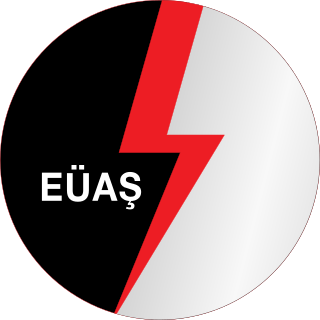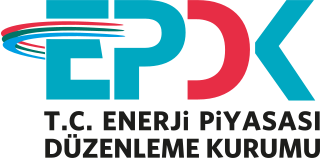Related Research Articles

The economy of Turkey is an emerging free-market economy. It ranked as the 17th-largest in the world and 7th-largest in Europe by nominal GDP in 2024. It also ranked as the 12th-largest in the world and 5th-largest in Europe by PPP in 2024. Turkey's rapid economic growth since the 2000s was stranded by the economic crisis in 2018, but it began to recover in 2021. Turkey's USD-based nominal GDP per capita and GDP-PPP per capita have eventually reached their all-time peak values in 2024. The country is expected to become a high-income economy in a few years.

Hacı Ömer Sabancı Holding A.Ş., commonly abbreviated as Sabancı Holding, is an industrial and financial conglomerate with headquarters in Istanbul, Turkey. The company's primary activities are in financial services, energy, cement, retail and industrial sectors. The founding Sabancı family continues to hold a majority stake. Sabanci Holding was first listed on the Istanbul Stock Exchange (BIST) in 1997. As of 2023, Sabancı Group operates in 14 countries across 5 continents, serving more than 40 million customers and providing employment for over 60,000 people. Additionally, the holding has joint venture partnerships with prominent global players such as E.ON, Bridgestone, Ageas, Heidelberg, and Carrefour.
Aygaz A.Ş. is Turkey’s 14th largest industrial organization according to the listing by Istanbul Chamber of Commerce. It is majority-owned by the Koç Holding, and partly floated on the Istanbul Stock Exchange.
Alarko Holding is one of the largest business conglomerates in Turkey; it is listed on the Istanbul Stock Exchange. It operates in various sectors, including construction, electricity generation and distribution, tourism, and real estate. It was founded by İshak Alaton and Üzeyir Garih in 1954.

Energy consumption per person in Turkey is similar to the world average, and over 85 per cent is from fossil fuels. From 1990 to 2017 annual primary energy supply tripled, but then remained constant to 2019. In 2019, Turkey's primary energy supply included around 30 per cent oil, 30 per cent coal, and 25 per cent gas. These fossil fuels contribute to Turkey's air pollution and its above average greenhouse gas emissions. Turkey mines its own lignite but imports three-quarters of its energy, including half the coal and almost all the oil and gas it requires, and its energy policy prioritises reducing imports.

The Electricity Generation Company is the largest electric power company in Turkey. Owned by the government, it produces and trades electricity throughout the country.

Berat Albayrak is a Turkish businessman and politician. He served as the Minister of Energy and Natural Resources from 2015 to 2018 and as the Minister of Treasury and Finance from 2018 to 2020. In the general elections of June 2015 and November 2015, he was elected as a member of parliament from Istanbul for the Justice and Development Party. He is married to Esra Erdoğan, the daughter of Turkey's President, Recep Tayyip Erdoğan.

Renewables supply a quarter of energy in Turkey, including heat and electricity. Some houses have rooftop solar water heating, and hot water from underground warms many spas and greenhouses. In parts of the west hot rocks are shallow enough to generate electricity as well as heat. Wind turbines, also mainly near western cities and industry, generate a tenth of Turkey’s electricity. Hydropower, mostly from dams in the east, is the only modern renewable energy which is fully exploited. Hydropower averages about a fifth of the country's electricity, but much less in drought years. Apart from wind and hydro, other renewables; such as geothermal, solar and biogas; together generated almost a tenth of Turkey’s electricity in 2022. Over half the installed capacity for electricity generation is renewables.

Turkey uses more electricity per person than the global average, but less than the European average, with demand peaking in summer due to air conditioning. Most electricity is generated from coal, gas and hydropower, with hydroelectricity from the east transmitted to big cities in the west. Electricity prices are state-controlled, but wholesale prices are heavily influenced by the cost of imported gas.
Tekirdağ gas power plant is a gas-fired power station in Tekirdağ Province northwestern Turkey with units A and B which are a few hundred meters apart.

Natural gas supplies over a quarter of Turkey's energy. The country consumes 50 to 60 billion cubic metres of this natural gas each year, nearly all of which is imported. A large gas field in the Black Sea however started production in 2023.

Coal, cars and lorries vent more than a third of Turkey's five hundred million tonnes of annual greenhouse gas emissions. They are mostly carbon dioxide and part of the cause of climate change in Turkey. A quarter of the emissions are from electricity generation.
The Zonguldak Eren Termik Santrali (ZETES) power stations in Zonguldak are 3 coal-fired power stations in Turkey totaling 2790 MW owned by Eren Holding via Eren Enerji.

The Afşin-Elbistan power stations are two coal-fired power stations in Turkey, a few kilometres apart in Afşin District in Kahramanmaraş Province. Both Afşin-Elbistan A, built in the 1980s, and the newer Afşin-Elbistan B burn lignite from the nearby Elbistan coalfield. As their mines are opencast and next to the power stations the coal is cheap. But as the existing units are the older subcritical type, and Turkish lignite is very low quality, they are not very efficient.
Eren Holding is a conglomerate headquartered in Istanbul, Turkey. It has business interests in paper, packaging, cement, energy, retail and textiles. The holding company was established in 1997, although the history of the group dates back to 1969.
İsken Sugözü power station is a 1320 MW operational coal fired power station in Turkey.

Fatih Dönmez is a Turkish engineer, politician and former Turkish Minister of Energy and Natural Resources from 2018 to 2023.
Kazancı Holding is a holding company based in Turkey. It was founded in the 1950s, is one of the energy groups of Turkey. In addition to the energy sector, the group companies, which also operate in the fields of agriculture and tourism, were merged under the umbrella of Kazancı Holding in 1994. The Chairman of the Board of Directors of the Holding, having its headquarter in Kavacik, Beykoz, is Cemil Kazancı.

The Energy Market Regulatory Authority is the market regulator for energy in Turkey.
Aksa Energy, is a publicly traded energy company which was incorporated in 1997 and generates electricity. The main shareholder of Aksa Energy is Kazancı Holding. Cemil Kazancı is the Board Chairman and CEO of the Company. Aksa Energy, having 13 power plant investments in 8 countries, carries out all power plant installation processes from project designing to procurement, construction and installation within its own organization. Aksa Energy has constructed and operated more than 30 power plants by using various energy sources such as coal, fuel oil, biogas, natural gas, wind and hydroelectricity so far today. In 2010, the share certificates of Aksa Energy were started to be traded on Borsa Istanbul with the code AKSEN. The share certificates of Aksa Energy are traded in the BIST 100, BIST Electricity, BIST Sustainability and BIST Corporate Governance Indices. Aksa Energy ranked 31st in the Fortune 500 survey for 2023 in which 500 largest companies of Turkey were included. The company ranked 38th in the Capital 500 survey for 2023.
References
- ↑ "About Us". www.epias.com.tr. Retrieved 2023-06-06.
- ↑ "EPİAŞ – Energy Exchange Istanbul – Europex" . Retrieved 2023-06-06.
- ↑ "EPİAŞ'tan 2023 YEK-G katılım ücreti uyarısı". Enerji Günlüğü (in Turkish). 2022-12-19. Retrieved 2023-06-06.
- ↑ "Turkey Launches Spot Natural Gas Trade System".
- ↑ "CHP'li Ahmet Akın: 'AKP iktidarı zam üstüne bir de gizli zam yapıyor'". www.cumhuriyet.com.tr (in Turkish). 2022-01-10. Retrieved 2023-06-06.
- ↑ "Borsa Istanbul". www.borsaistanbul.com. Retrieved 2023-06-06.
- ↑ "NBET, Turkish firm begin knowledge exchange - Daily Trust". dailytrust.com. Retrieved 2023-06-06.